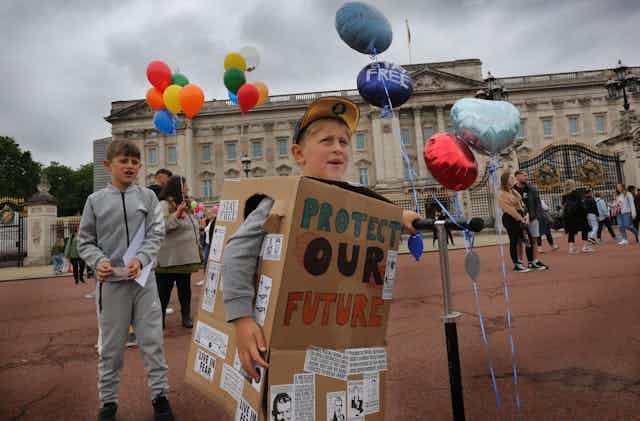At age 11, children from poorly educated families are as interested in politics as children from well-educated ones. But by the time they turn 15, children with well-educated parents are 10% more interested in politics than those with poorly educated parents.
The social gap in political engagement is one of the most persistent problems in western democracies. It leads to disadvantaged people having less say in the democratic process. And it skews electoral results towards the interests of privileged groups in society.
Compared with much of Europe, the UK has the largest gap in voting between young adults from middle-class and working-class backgrounds. In a recent study we sought to determine at what age the gap becomes apparent and whether it persists into adulthood. What determines how politically aware and active a child will be?

Youth engagement
In 2020, we set out to explore the development of political engagement between ages 11 and 25. We analysed data from the British Household Panel Study and its successor, Understanding Society, the longest-running study of the UK population.
We relied on the question: “How interested would you say you are in politics?” to gauge political interest. And we used the education levels of parents and their political engagement as indicators of class background.
We found that, at age 11, children from the most and least educated families share a broadly similar level of interest in politics. In fact, children from less-educated families actually show a slightly higher level of interest.
However, by age 15 the political interest of children from the most educated parents has hardly changed: they remain as interested in politics as they were when they were 11. But for the least educated families, however, the level of interest children show in politics has markedly declined. After age 15, political interest rises steadily among both groups but the difference between them stays the same.

We also looked at voting intentions, which is an important predictor of voting behaviour. We measured this with a question that asked young people which party they would vote for as adults. We used the response options, “none” and “don’t know”, to signal a lack of intention.
As with political interest, we find a growing social gap on this indicator of political engagement. At age 11 there is no difference between children from well- and less well-educated families in their voting intentions.
As they grow older, both groups become more interested in voting for a particular party. However, this growth is stronger among children from well-educated families.
By age 15, these children express a much greater willingness to vote than their peers from disadvantaged backgrounds and this difference remains stable in the years thereafter. These patterns, therefore, suggest that early adolescence is a crucial stage for social differences in political engagement to emerge.
Parental input
The degree to which parents are politically engaged themselves seems to matter, too – and from an early age. We already see a large gap at age 11 between children from politically active families and those from disengaged ones, in terms of how interested they are in politics and whether they intend to vote.
This gap further widens during early adolescence. Children of parents who are not actively engaged in the political process are even less likely to be interested in becoming so by the time they’re 15.

After age 16, the gap stabilises. So, while early childhood seems to be the crucial phase for politically engaged parents to pass their preferences on to their children, early adolescence is the key phase when the education of parents begins to matter.
Our findings show that parents have a lasting influence on their children’s political development. Once established during childhood, social differences in political engagement continue into adulthood. These differences highlight how political inequality is transmitted through the generations. An important task of future research is to examine how exactly educated and engaged parents make their children become more politically engaged.

